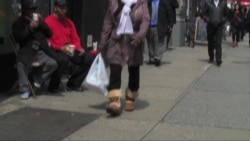As U.S. consumers drive the holiday shopping season, they typically carry new purchases home in plastic shopping bags.
The bags used this holiday season, which often become a nuisance, dotting unkempt landscapes and polluting waterways, represent only a fraction of the huge number of disposable sacks used for packing groceries and other items throughout the year.
“They get caught in bushes and trees, in storm water systems, they end up clogging up sewers,” says Janet Larsen, Director of Research for the Earth Policy Institute in Washington.
In an effort to reduce the environmental impact, California on September 30 became the first state to ban businesses from providing new plastic bags for customers. Other states and cities have already adopted similar legislation, charging a small fee for every bag handed out in order to encourage people to bring their own bags when they go shopping.
Municipalities in Michigan, Kansas and Arizona are currently debating similar laws.
But Mark Daniels, Senior Vice President for Environmental Policy at South Carolina-based Hilex Poly — one of the country’s largest plastic bag manufacturers and recyclers — says shoppers should get new plastic bags for free.
“Every single scientific litter study that has been done always show that plastic retail are a fraction of one percent,” he said, calling the thin plastic sacks a good environmental choice.
Noting the claim by environmentalists that plastic bags are clogging landfills, Daniels points to a study by the Environmental Protection Agency that refutes that.
“All plastic bags, not just retail bags, are 4/10ths of one percent of the waste stream,” he said.
Despite that statistic, Washington, DC, imposed a five-cent fee on every plastic bag given out by businesses in the city. The money is being used to clean up the local Anacostia watershed, and, according to one city official, the effort is making a difference.
Brian Van Wye, head of Stormwater Program Implementation at the DC Department of the Environment, says once people were required to pay for the bags, they used fewer of them and, subsequently, fewer bags ended up in the water.
“The stream clean-up groups are telling us that they’ve seen a 60-percent reduction in disposal bags they find while they’re doing stream cleanups," he said, adding that the five-cent tax has helped save aquatic life.
“We also know that plastic bags, they break down over time," he said. "It's something aquatic life will consume and ingest and that can cause serious harm and potentially death for aquatic life like fish and turtles.”
But customers who say they need shopping bags aren’t happy about paying for them. At a Washington restaurant, Bill Ford says he has to use a bag to carry out his lunch.
“I don’t know why some people need to pay because a small minority of people are throwing stuff into rivers and waterways,” he said.
But Carol Powers, who also paid for a bag, is in favor of the DC program.
“It seems kind of silly to pay five cents for a bag but if that’s what it takes to help save the environment then it’s a good idea.”
However, instead of taxing or banning bags, Daniels of Hilex Poly says recycling the bags is a better alternative.
“We reprocess it, we clean it, we shred it, we make new post-consumer recycled products and put that back into the manufacturing of new bags,” he said.
But Larsen doesn’t think that’s the answer.
“The plastic bag industry has often used recycling as a deterrent for communities that, even when residents are saying, 'we want to limit these,'" she said. "It really doesn’t help to minimize the problems.
“What we would advocate for would be a washable, reusable bag to take the place of all those plastic bags.”
Bags like the reusable grocery tote — many of which are made of recycled materials — that Carol Chastang uses to carry her lunch.
“This is my contribution to keeping the environment cleaner and safer,” she said.
More than 18 million Americans now live in communities that tax or ban plastic bags, and that number is expected to go up again next year.






